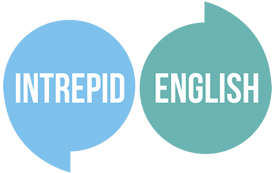The passive voice is a tricky grammar subject for many English language learners. When we use the active voice, the subject does the action (“I ate an apple.”). However, in the passive voice, the focus of the sentence switches, and the subject receives the action. We use the verb to be and the past participle form of the main verb to form the sentence (“The apple was eaten (by me).”)
We use passive voice when the doer of the action is obvious, unimportant, or unknown. If we want to say who did the action, we can use the preposition ‘by’.
Passive voice is generally considered to be a more formal way of speaking English. You may often see it used in news articles, to add emphasis to the action, and the receiver of the action, rather than the doer. For example, “A new species of frog has been discovered.” or, “Report finds that covid rules were broken.”
Recently, Kate R covered this topic in her Friday Live Ask Us Anything on YouTube. You can watch the video lesson right here. Also, don’t forget to download your free Passive Voice Cheat Sheet at the bottom of the blog!
How to form the passive voice
The passive voice can be used in any tense which uses the verb to be. Conjugate the verb to be accordingly, and for the main verb, use the past participle form. Let’s have a look at the passive voice in different tenses in more detail.
Passive Voice in Present
Affirmative: Subject + Am/Is/Are + Past participle
Negative: Subject + Am not/isn’t/aren’t + Past participle
Question: Am/Is/Are + Subject + Past participle?
For example: Spanish is spoken in Colombia.
This area isn’t often affected by such extreme weather.
Are poisonous spiders found in this area?
Passive Voice in Past
Affirmative: Subject + Was/were + Past participle
Negative: Subject + Wasn’t/weren’t + Past participle
Question: Was/Were + Subject + Past participle?
For example: Andrea was promoted to regional manager.
Henry wasn’t invited to the party.
Was this product made locally?
Passive Voice in Future
Affirmative: Subject + Will + Be + Past participle
Negative: Subject + Won’t + Be + Past participle
Question: Will + Subject + Be + Past participle?
For example: The ribbon at the opening ceremony will be cut by the town’s mayor.
Meat won’t be served at the event. It’s a vegetarian menu only.
Will the carpets be cleaned tomorrow?
Passive Voice with Present Perfect
Affirmative: Subject + Have/has + Been + Past participle
Negative: Subject + Haven’t/hasn’t + Been + Past participle
Question: Have/Has + Subject + Been + Past participle?
For example: A forest fire near the highway has been brought under control by firefighters.
The customers haven’t been given a refund yet.
Has the thief been found yet?
Remember, the passive voice can be used with all tenses or auxiliaries which use the verb to be. In fact, I just used it now! This includes with progressive tenses, other perfect tenses (such as past perfect or future perfect), and auxiliaries such as ‘can’, ‘could’, ‘must’ and ‘should’.
Intrepid English Members can study the verb tenses in more detail with our Fast Grammar: Verb Tenses course in the Intrepid English Academy. Not a member yet? Check out one of our free taster courses right here.
Don’t forget to download your free Passive Voice cheat sheet and complete the practice activity.
Practice activity
Complete the following sentences using the passive voice in a suitable tense.
- Animal Farm [write] by George Orwell.
- Many different types of berries [grow] on this farm.
- The criminals [found] by police hiding out in an abandoned warehouse.
- If you leave towels on the floor, they [change].
- The city of Christchurch [hit] by a large earthquake in 2011.
- All of the exams [mark]. It’s time for the students to collect their results.
- Gravity [discover] by Isaac Newton.
- If you don’t have photo ID, you [allow] in to the event.
- The first thermoelectric power generator [create] by Maria Telkes, a Hungarian scientist in 1947.
- ‘You Oughta Know’ [write] and originally [sing] by Alanis Morissette, and [cover] by Beyoncé at her iconic 2011 Glastonbury headline show.
Intrepid English Members can study this and other useful grammar topics in our Fast Grammar self-study course.
Not a member yet? Check out our membership options here, or book a trial lesson with an experienced and friendly Intrepid English Teacher today to talk about your English learning goals and find out if online English lessons are right for you.
